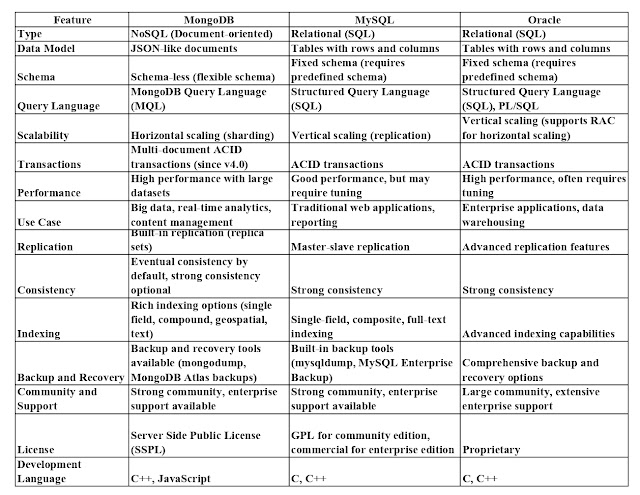What is MongoDB
MongoDB is a popular open
source NoSQL database that uses a document-based data model. It stores
information in flexible documents, such as JSON, and allows different data
structures and fields to be used in a single storage. It facilitates a seamless
system and flexibility to adapt to changing data needs. With its powerful
querying and indexing capabilities, MongoDB is perfect for a variety of
applications. It is often chosen for modern web applications because of its
performance, flexibility and scalability. It is commonly used in modern web
applications due to its functionality, flexibility and scalability.
Scope of MongoDB
MongoDB has a huge and
growing attain in diverse domain names because of its flexibility, scalability
and ease of use. Here are a few areas wherein MongoDB is especially impactful:
Web
applications: MongoDB is a popular choice for backend
garage in net and cell packages because of its capability to handle large
quantities of unstructured statistics and its assist for JSON-like documents.
Big
Data and Analytics: Its capacity to keep and manage big
datasets makes MongoDB perfect for huge statistics programs, along with
real-time analytics, log evaluation, and statistics warehousing.
Content
Management Systems (CMS): MongoDB's bendy schema layout is
good for managing diverse content kinds and systems, making it nicely ideal to
CMS platforms.
E-commerce:
MongoDB supports excessive-overall performance, excessive-availability
architectures which can be best for e-commerce systems that require rapid and
dependable statistics get right of entry to.
Finance
and Banking: Its robust stability and availability
are essential for economic packages that call for strong transaction assist and
protection.
Healthcare:
MongoDB's flexible statistics model is useful for coping with diverse medical
facts and helping advanced analytics crucial to healthcare systems.
Media
and Entertainment: MongoDB successfully manages various
media content material and consumer interactions, imparting a sturdy backend
for streaming services and interactive media programs.
Freshers have diverse
possibilities in the MongoDB environment, as the demand for NoSQL databases
keeps to develop throughout various industries. Here are some areas where
freshers can locate possibilities associated with MongoDB:
1.
Junior Database Administrator (DBA)
Role:
Managing MongoDB deployments, making sure database performance, availability
and safety.
Required
Skills: Basic knowledge of database management, familiarity
with MongoDB shell and information of database backup and restoration
approaches.
2.
Backend Developer
Role:
Developing
server-aspect good judgment, integrating MongoDB for information storage and
developing RESTful APIs.
Required
Skills: Proficiency in a backend programming language
(including Node.Js, Python, or Java), information of CRUD operations in
MongoDB, and familiarity with Mongoose (for Node.Js).
3.
Data Analyst
Role:
Extracting, studying and visualizing facts stored in MongoDB to provide
commercial enterprise insights.
Skills
Required: Knowledge of querying MongoDB the use of an
aggregation framework, experience with facts visualization gear, and simple
statistical evaluation talents.
4.
DevOps Engineer
Role:
Implementing and handling MongoDB deployments in cloud environments, automating
database operations.
Required
Skills: Understanding of CI/CD pipelines, expertise of cloud
structures (including AWS, Azure, or GCP), and familiarity with automation
equipment inclusive of Ansible or Terraform.
5.
Technical Support Engineer
Role:
Provide aid for MongoDB-associated troubles, helping customers with database
issues.
Skills
Required: Strong hassle-solving abilities, expertise of MongoDB
architecture and accurate verbal exchange talents.
6.
Full-Stack Developer:
Role:
Building and maintaining both the front-end and back-end components of web
applications, with MongoDB as the primary database.
Skills:
Proficiency in front-end technologies (HTML, CSS, JavaScript) and back-end
frameworks (Node.js, Django, Flask), along with experience in MongoDB.
Comparisons with other Data Bases
Official Resources to Learn MongoDB
Offers free online courses and certifications on various MongoDB topics, from basics to advanced usage.
Courses include "Introduction to MongoDB," "MongoDB for Developers," and "MongoDB Administration.
Comprehensive and detailed documentation covering all aspects of MongoDB.
Includes tutorials, best practices, and reference materials for both beginners and advanced users.
Books
1. MongoDB: The Definitive Guide by Shannon Bradshaw, Eoin Brazil, and Kristina Chodorow
Comprehensive guide covering all aspects of MongoDB.
Suitable for both beginners and experienced users.
2. MongoDB in Action by Kyle Banker
Practical book focusing on real-world applications of MongoDB.
Includes detailed examples and case studies.
Blogs
MongoDB Blog (Click the Link)
Regularly updated with articles on new features, use cases, and best practices.
Written by MongoDB experts and contributors.
YouTube Channels
MongoDB YouTube Channel (Click the link)
- Official
channel with tutorials, webinars, and conference talks.
- Includes
content for both beginners and advanced users.


Comments
Post a Comment